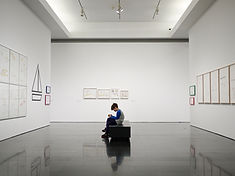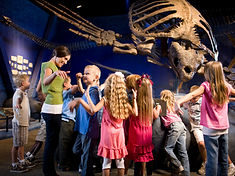Supported by
Connect with your audience through the Sentomus visitor study.
Following a successful first edition, Sentomus will again be made available to museums in 2026. The study is now offered as a permanently accessible tool that museums can use as needed or on an ongoing basis.
The study offers an accessible, scientifically grounded method to survey your visitors on all relevant aspects of their museum experience.
The study is offered in Austria, Belgium, France, Germany, Italy, the Netherlands, Spain and the United Kingdom. New countries will be added this year.
Read the publications by NEMO, the German Museums Association (Deutscher Museumsbund), Faro, ICOM Belgium Flanders, ICOM France, ICOM Italia, ICOM Austria, the Austrian Museums Association (Museumsbund Österreich), and the Netherlands Museum Association (Museumvereniging Nederland).




Sento ~ Esperanto: "Feeling, Experience"
Esperanto (/ˌɛspəˈrɑːntoʊ/ or /ˌɛspəˈræntoʊ/) is the world's most widely spoken constructed international auxiliary language, intended to be a universal second language for international communication – "the international language".

What will I learn from this study?
Through this study, you will receive feedback from your visitors on relevant museum areas:
-
Experience in the museum
-
Evaluation of the offer, infrastructure, and general conditions
-
Audience profile, preferences, and motivations
-
Economic contribution
-
Development and well-being of visitors (Impact Compass Model)
-
Assessment of communication
-
Why do former visitors no longer come?
-
Why do non-visitors not come? How can they be convinced?
-
Open questions > concrete feedback & suggestions
-
And much more

Personalized Questionnaire
The study provides a well-designed and balanced questionnaire that addresses the important aspects of the museum visit.
The questionnaire was developed in collaboration with the study’s scientific partners and national industry associations.
The questionnaire is fully personalized to the local context of your museum. If there are specific questions you do not wish to ask, you may remove them.
You also have the option to add questions that are of particular importance to your museum.

Reporting & Benchmarking
You will receive a comprehensive research report with the results for your museum.
Museums that wish to use Sentomus on a permanent basis receive a detailed research report twice a year.
In addition, you will have the opportunity to (anonymously) conduct benchmarking with a cluster of comparable museums and the international results.
You will receive access to a personal, dynamic dashboard with filtering options, cross tables, and charts, which you can view and use interactively at any time.

Privacy
Data Protection
The study is fully independent: all research results and data collected for your museum remain your property at all times and are never shared with third parties.
The privacy of all respondents is guaranteed in full compliance with the EU General Data Protection Regulation (GDPR).

Reaching respondents
The study provides the necessary communication tools to invite your visitors to take part in the survey.
Incentives are offered to further encourage people to share their opinions.

Is it labour-intensive for my organisation to participate?
The study is designed to interfere as little as possible with the workload in your museum.
The study follows a predefined process in three simple steps:
-
Confirm participation (here)
-
Provide the research team, via a dedicated website, with specific information about your museum. This information will be used to program the survey tailored to your museum.
-
Easily inform your audience about the survey using the provided communication materials.
At the end of the study, you will receive your personal report with comprehensive results.

How much is the participation fee?
Thanks to the unique approach of this study, the participation cost can be kept as low as possible.
The participation fee ranges between €625.00 and €1,750.00, depending on your institution’s revenue. This fee includes all services.
Market prices for comparable studies are many times higher.
You may choose to have the invoice amount split across two financial years.

When?
The research period runs throughout the entire year. You can survey your audience whenever it suits your museum best. Two reporting dates are available: June or December.
Museums that wish to use Sentomus on a permanent basis receive a comprehensive research report twice a year.
You can register your museum for this study here.


Prof. Dr. Annick Schramme
Master in Cultural Management, University of Antwerp
Antwerp Management School


Dr. Raphaëlle Bats
Curator
URFIST Bordeaux & STI Reference
University of Bordeaux


Dr. Juan De Dios Montoro Pons
Associate Professor, Applied Economics
University of Valencia


Giulia Cancellieri
Researcher in Economics and Business Management
Ca’ Foscari University of Venice


Prof. Dr. J.A.C. (Johan) Kolsteeg
Art Sciences
Organisation and Communication in the Arts; Cultural Democracy
University of Groningen


Prof. Dr. Juliette Passebois-Ducros
Head of Master's Programme in Marketing Strategy and Communication
University of Bordeaux


Prof. (FH) Dr. Verena Teissl
Professor of Cultural Management and Cultural Studies
Festival Studies, Cultural Tourism, Cultural Sector Ecosystems


Prof. Dr. Bridget Mandel
Audience Development
Research on Cultural Participation
Cultural PR and Cultural Marketing University of Hildesheim


Prof. Dr. Manuel Cuadrado García
Associate Professor of Marketing and Market Research
Department of Marketing
University of Valencia


Prof. Dr. Francesco Casarin
Professor of Marketing Strategy
Ca’ Foscari University of Venice

Incentives
To further support respondent engagement, the research project provides several incentives.
For every fully completed survey, 1 m² of rainforest is preserved in partnership with the recognized organization World Land Trust. Additionally, several trips will be raffled among participants who have fully completed the survey.

.jpg)








.png)
